I don’t know about you but I don’t have the same energy every day, and I don’t want to do the same kind of things every day. Some days, I am more focused and social, some other times I feel more easily distracted and introspective. Sure, I could force myself to have that conversation call with my Italky teacher, or I could spend 10 minutes looking at flashcards knowing that I won’t remember a thing the next day… I can soldier on and keep pushing myself to work on my language, OR I could follow my inner compass, trust my body and do what feels right, which could be to cancel my conversation class and read my book in Spanish instead.
Of course, cancelling on the same day and reorganising all my learning activities every day, won’t be a very productive way of learning long term. So, the question is: How to be consistent if you follow your body’s desires rather than logical planning?
Let’s start acknowledging that this post is not for everybody. This post is designed for humans with vaginas, aka. menstruators. Because us, menstruators, are cyclical beings. And this, my loves, is a superpower when we don’t allow our logical (and patriarchal society) override our inner compass.
Being in flow with your body and energy is important, and the key to a successful language learning experience.
I do believe in routines and planning though. So if I want to learn a language I need to be consistent and disciplined. But, do I need to show up for my learning practice, in the same way, every day? Hell no! Ni hablar.
But first, Why am I sharing this?
“Menstrual blood is the only source of blood that is not traumatically induced. Yet in modern society, this is the most hidden blood, the one so rarely spoken of and almost never seen, except privately by women.”
– Judy Grahn
Bleeding is still quite taboo. In many communities, menstruators are still cast out of home when they bleed. Even in Western societies, we give funny names to our bleeding time so I don’t say we have our period. I remember calling it “my prima Rosa” (my cousin Rose).
Things are slowly changing although there is still a negative narrative about periods and menstrual blood as something that is gross and debilitating.
And because is something we don’t talk about, our systems (working system, educational system) are not designed for cyclical humans, but rather for the linear ones (people with no vaginas).
However, as I said, things are changing and we are starting to have these conversations. There are amazing entities providing education and talking about this, such as Red School, Claire Baker, Lisa de Jong amongst others.
This post focuses on cyclical learning for cyclical beings. Because I do believe in learning in circles rather than in a straight line.
I am here to outline what is going on in your body internally so you can optimise your language learning practise externally. But I am not here to tell you what to do. We have been told what to do long enough.
You know better than anybody what you need and what works better for you.
Know yourself
Track your cycle (I use Clue App) and journal.
This habit has been gamechanger for me. In every entry of my journal, I write the date, “my date” (the day I am in my cycle) and the moon phase. Then I write about my mood, how my body is feeling… Basically I write about what is going on in my life, what is working and what is not working. Having this information black on white makes it easier for me to go back to and see where I need to make adjustments.
Track your cycle and find out what works better for you. And then do that. Guilt or shame-free.
Also, share it with your people. Who knows, maybe there is a friend or follower out there in need to speak about her period and by seeing you talking about it, feels “permission” to do so.
Menstrual cycle + Language Learning Plan
Before I lay out the learning plan (and again, remember this is a suggestion, the more you track your cycle, energy levels and best activities for each phase of your cycle, the better you’ll know what activities work best for each phase) I want to remind you that we are not in a hurry. We are allowed to “not” be fluent in 3 months, we can take our time. It’s not about fast, groundless results, it’s about a deeply rooted outcome.
Nature does not hurry yet everything is accomplished
– Lao Tzu
We, menstruators, are cyclical beings.
We have seasons, just like the planet we are part of.
When we try to “override” our cycle, we are working against ourselves, which is not nice. Our cyclical nature is our superpower, and when we follow our inner rhythm and act on it, we become more productive and effective.
Let’s see what is going on with your body (hormones), how it manifests in you (being) and what are the best activities you can do in each phase (doing).
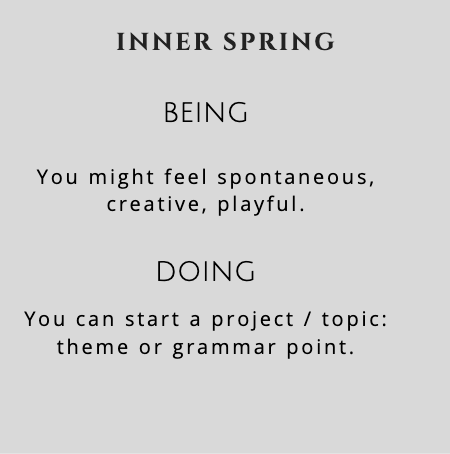
Pre-Ovulation - Inner Spring
- Hormones – Your oestrogen rises but your progesterone is still low although on the rising. Your testosterone levels rise towards ovulation.
- Being – Your energy levels start to rise, you feel open to adventure, spontaneous, playful, social and active.
- Doing – This is the best time for taking action on tasks and projects. This could be a new topic or grammar point. Plan the cycle ahead with activities, tasks, lessons, conversation classes and language exchanges.
Ovulation - Inner Summer
- Hormones – Your oestrogen and testosterone levels are at their peak, and your progesterone is flying high.
- Being – You are feeling strong and resilient, with lots of energy and stamina to take on the world.
- Doing – Social life, events, talks, energy-consuming tasks, action!!!! Time to reinforce the point you started in the previous phase: memorisation, lessons, drilling exercises, everything that takes up energy for you: maybe gather all your language exchange sessions here (if you are an introvert this will feel doable, but a pain in the premenstrual and menstruation time, believe me!)
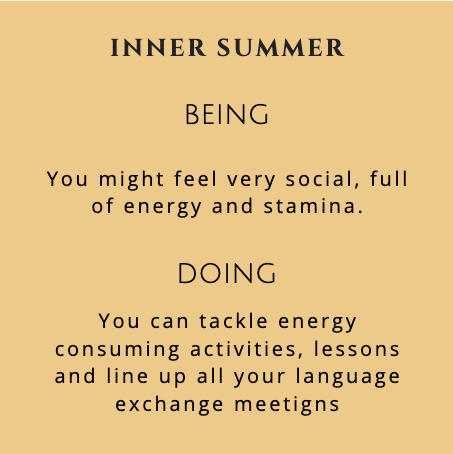
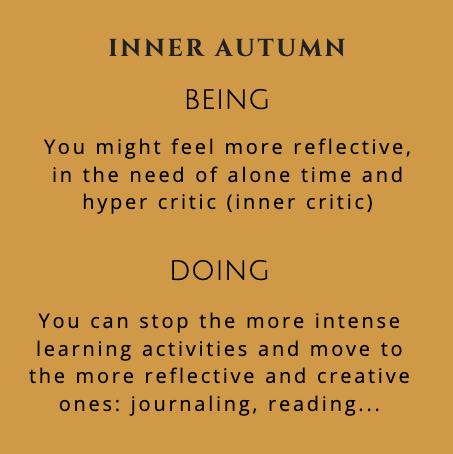
Pre-Menstruation - Inner Autumn
- Hormones – Progesterone is high, then oestrogen and progesterone levels go down.
- Being – We go inwards, more connected with nature and in need of alone time. Our inner critic voice is loud! Time to integrate what you have been practising and working on in the last two phases.
- Doing – Reflective activities: journaling, writing… More relaxed activities like watching movies or listening to music. Make the topic yours by doing activities in which you use your emotion and heart rather than your brain.
Menstruation - Inner Winter
Hormones – Your hormones are at their lowest point. Bleeding starts and then your oestrogen starts to increase.
Being – This is the time to BE. Rest. Take your time and don’t force yourself to do learning activities if they don’t feel right. Listen to your body and follow your intuition. You will see how you have developed intuition over the topic you have been working on this cycle.
Doing – Do the bare minimum. Maybe go for walks in nature or in the park while listening to a gentle guided meditation in Spanish, or music. Maybe a softspoken podcast? Read your favourite book in Spanish (even if you are re-reading it) or journal.
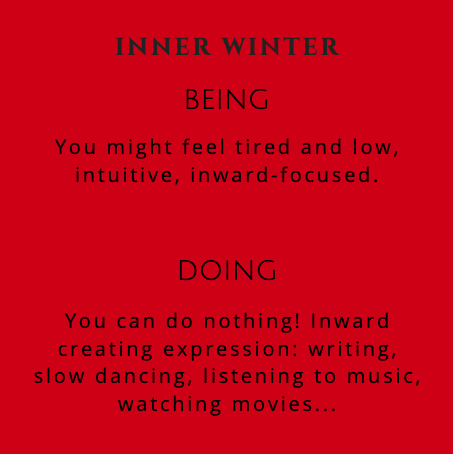
Your Own Study Phases
This is a visual representation of how each phase in the menstrual cycle feels like, and the different activities you can engage in.
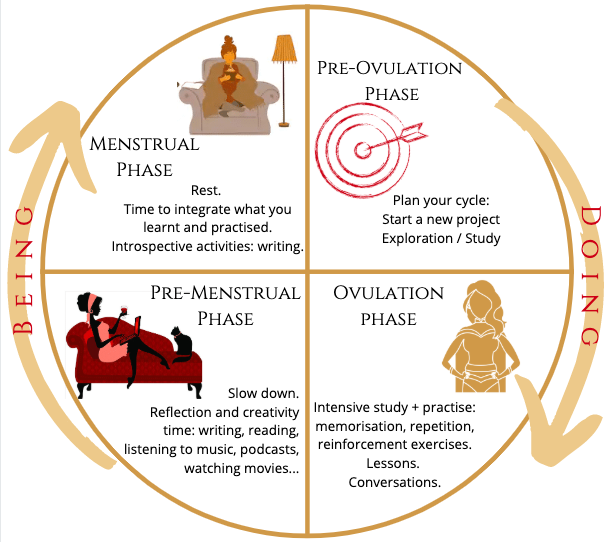
This is a cyclical method, that means that it is repeated in circles. Same structure, going deeper and deeper into your target language in a gentle way, taking you along the process.
No finish line. Just deeper learning.
Are you up for the journey?


